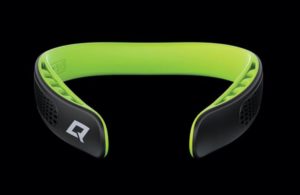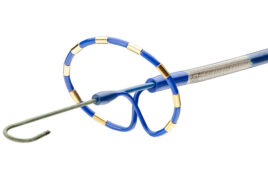 The FDA announced today that it authorized the Q-Collar made by Q30 Sports Science for protecting the brain during sports activities.
The FDA announced today that it authorized the Q-Collar made by Q30 Sports Science for protecting the brain during sports activities.
Q30 Sports Science’s Q-Collar is a C-shaped collar worn around the neck designed to apply compressive force to the neck and increase blood volume to help reduce movement of the brain within the cranial space, which is something that may occur during head impacts, according to a news release.
Compressive force provided by the device goes to the internal jugular veins, which in turn increases the blood volume in the skull’s blood vessels, creating a tighter fit of the brain inside the skull and reducing unrestrained movement of the brain within the skull, known as a “slosh.” It can be worn for up to four hours at a time and should be replaced after two years of active use or upon its expiration date.
The device could reduce the occurrence of specific changes that are associated with brain injury and is authorized for athletes 13 years old and up during sports activities to aid in protecting the brain from the effects associated with repetitive sub-concussive head impacts.
A study of the Q-Collar, for which results were released in October 2018, observed 46 female high school soccer players. Twenty-four of them wore a Q-Collar. All 46 athletes underwent neuroimaging at up to three points in time over a six-month period. This included the 3-month soccer season and 3-month post-season rest period, with no exposure to head impacts. Head impacts were tracked using accelerometers–a computer chip–placed behind the left ear during practice and games.
The FDA assessed the device through several studies, including a longitudinal study in the U.S. with 284 subjects aged 13 and older participating on a high school football team. Over the course of the season, 139 athletes wore the Q-Collar and 145 did not, while all participants also wore an accelerometer device for measuring every impact to the head sustained during play. Each athelte underwent an MRI during pre-season and post-season.
Significant changes were found in deeper tissues of the brain involved in the transmission of electrical nerve signals in 106 of the 145 (73%) participants in the no-collar group, while zero significant changes in those regions were observed in 107 of 139 (77%) in the Q-Collar group.
“Today’s action provides an additional piece of protective equipment athletes can wear when playing sports to help protect their brains from the effects of repetitive head impacts while still wearing the personal protective equipment associated with the sport,” acting director of the Office of Neurological and Physical Medicine Devices in the FDA’s Center for Devices and Radiological Health Dr. Christopher M. Loftus said in the release.
The Q-Collar does not replace and should be worn with other protective sports equipment associated with specific sports activities and wearers of the device should not depend on it to protect them from all harmful effects of head impacts, the FDA said.
FDA noted that the Q-Collar has not been tested and should not be used on athletes with the following conditions:
- Increased pressure in the skull (including uncontrolled ocular-glaucoma)
- Increased presence of acid in the body or excessive blood alkalinity
- Open head injury (including in or around the eye) within the past six months
- Pseudotumor cerebri (false brain tumor)
- Presence of brain or spinal shunt
- Accumulation of cerebrospinal fluid within the brain
- Known seizure disorder
- Known trachea abnormality
- Known airway obstruction
- Known carotid hypersensitivity
- Blood clot in the brain
- Increased likelihood of blood clotting (coagulation)
- Collections of small blood vessels in the brain that are enlarged and irregular in structure
- Skin injury, rash, or other abnormality on or around the neck




